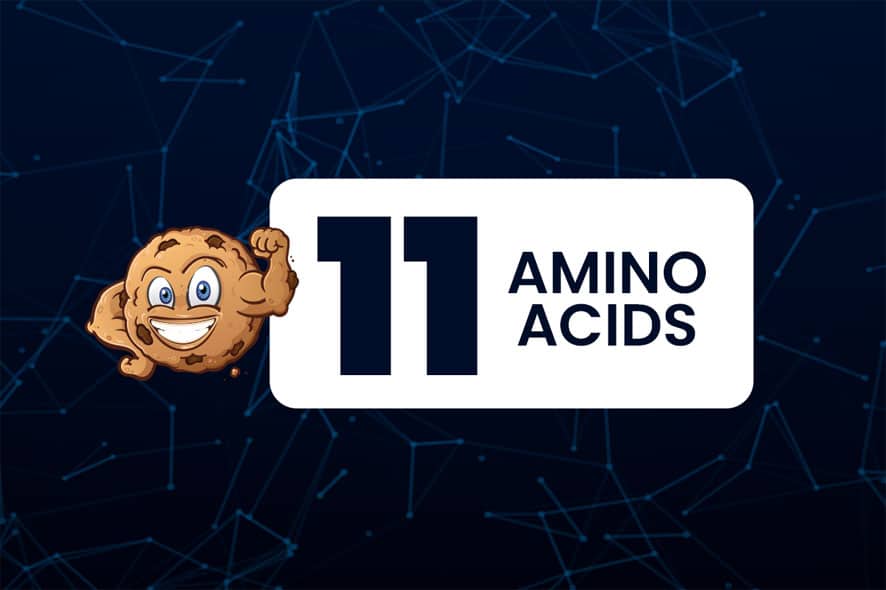Although humans are made of around 250,000 different proteins, they are made up of only 20 amino acids. Our body only can make 11 of them, the rest must be obtained from food. The other nine are called essential amino acids. They cannot be synthesized in our body, so we have to get them from food.
They are histidine, isoleucine, leucine, lysine, methionine, phenylalanine, threonine, tryptophan and valine.
However, the important thing is to incorporate these nine amino acids simultaneously. This is where the difficulty lies since most foods do not have all the essential amino acids in sufficient quantities.
Consuming essential amino acids is crucial for good health. The best way to ensure that you get adequate amounts of essential amino acids is to eat various food containing protein on a daily basis. Given the modern diet and easy access to a wide variety of foods, it’s rare for people to have protein deficiency. People should always talk to a doctor before using supplements.
-
- Food of animal origin: Some foods such as lean meats, eggs, milk and their derivatives contain the nine essential amino acids and also the 11 non-essential ones that our body requires to function properly.
- Foods rich in isoleucine, valine, leucine, phenylalanine, threonine, methionine, histidine, and lysine are meats and fish, such as pork, chicken, beef, salmon, grouper, tuna, and sardine.
- Foods rich in tryptophan include poultry such as chicken, turkey, and rabbit, and fish such as salmon, sardines, scallops, grouper, cod, and tuna.
- Milk and its derivatives, especially cheese, also contain practically all amino acids.
- The egg, especially the egg white, contains amino acids such as isoleucine and valine.
- Cottage cheese and wheat germ contain high quantities of threonine.
- Methionine is in eggs, grains, nuts, and seeds.
- Valine is in soy, cheese, peanuts, mushrooms, whole grains, and vegetables.
- Isoleucine is abundant in meat, fish, poultry, eggs, cheese, lentils, nuts, and seeds.
- Phenylalanine is in dairy, meat, poultry, soy, fish, beans, and nuts.
- Tryptophan is present in most high-protein foods, including wheat germ, cottage cheese and chicken.
These are just a few examples of foods that are rich in essential amino acids. All foods that contain protein, whether plant-based or animal-based, will contain at least some of the essential amino acids. Does this mean that we should eat only animal protein?
Absolutely not!
The intake of protein of animal origin (despite having all the essential amino acids) is connected with the high intake of fat; something that does not happen with plant proteins.
Vegetarian food
Some foods of plant origin do not contain the nine essential amino acids, but we can simply combine different plant-based products without a need to implement products of animal origin. “If you have been told that you only get complete proteins in foods of animal origin, this is a myth that we must leave behind because not all proteins of plant origin are incomplete.”
Chickpea, soy, some beans, buckwheat, quinoa, amaranth, hemp seeds and pistachios contain all the essential amino acids. Lentils, for example, have a limited amount of the essential amino acid methionine and cereals, like brown rice, for example, contain little lysine and threonine. Therefore, if we make a combined plate of lentils (rich in lysine, low in methionine) with brown rice (rich in methionine and low in lysine) we will get a plate with complete protein.
Doctors previously believed that people had to eat foods that provided all nine essential amino acids in one meal. As a result, unless an individual was eating meat, eggs, dairy, tofu, or another food with all the essential amino acids, it was necessary to combine two or more plant-based foods containing all nine amino acids, such as rice and beans. People who follow vegetarian or vegan diets can get their essential amino acids from the various plant-based foods throughout the day and do not necessarily have to eat them all together in one meal. A balanced diet is a key to success, whether it is plant-based or not.

